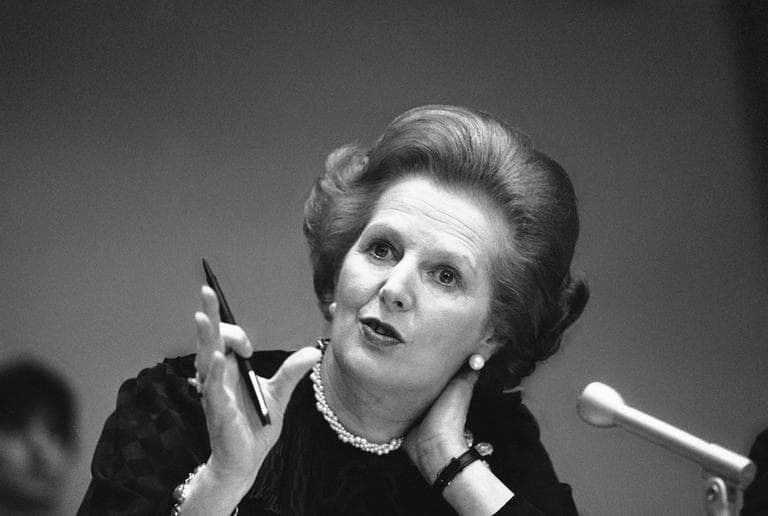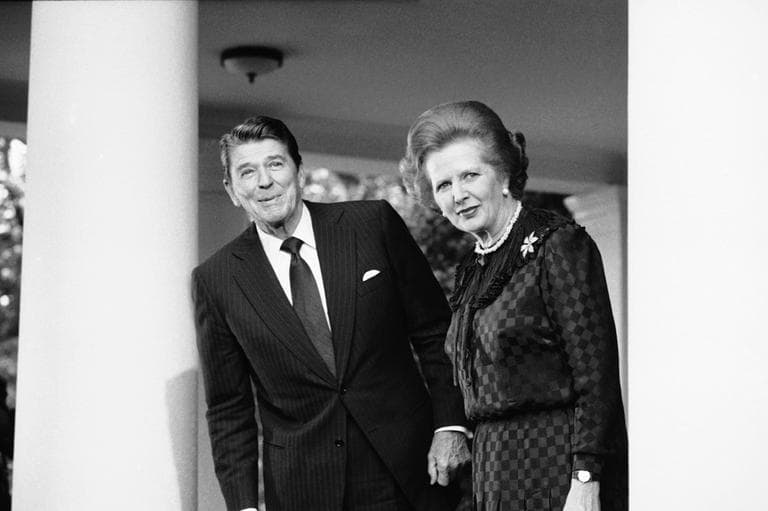Advertisement
Britain's 'Iron Lady' Margaret Thatcher Has Died

The Falklands Islands government tweeted, "We will always be thankful for all she did for us." Slate magazine called her a feminist.
But on CNN, Sinn Féin leader Gerry Adams said she hurt the Irish and British people. And the Daily Mirror headline screams: "Margaret Thatcher dead: Former PM's death hailed as a "great day" for coal miners."
Margaret Thatcher, Britain's first female prime minister, died Monday at 87.

Hers is a clear legacy for those who say her iron will bucked up a flagging nation, broke the miner unions, triumphed in a far-off war.
It's more complicated for critics who say she broke the unions, refused to give jailed Irish hunger strikers political status and launched a foolish war in the Falkland Islands that resulted in hundreds of deaths.
"It's a tidal wave of comment," Michael Goldfarb, an American journalist in London and NPR's London bureau chief, told Here & Now. "Some are very happy that she's dead, but most of the comment has been extraordinarily respectful."
Rule of the "Iron Lady"
Thatcher became British prime minister in 1979 - the only woman to have held the job.
"This is a force of nature, easily the most dynamic and dramatic figure I've ever lived under - I'm really old. Maybe LBJ had the same kind of dramatic reshaping of a society. But she took this country for better or worse and dragged it by the scruff of its neck to the vision she had for it," Goldfarb said.
Thatcher remade Britain's economic landscape with a free-market philosophy and the goal of privatizing state industries. And she would wage some hard-nosed battles with the country's labor unions.
She also played an important role in ending the Cold War, though some critics say both she and U.S. President Ronald Reagan were slow to realize the collapse of the Soviet Union.
Relationship with Reagan
Thatcher had a close relationship with Reagan, calling him "the second-most important man in my life." Reagan called Thatcher "the best man in England."
While they both came from humble backgrounds, their personalities were markedly different. Thatcher was aggressive and dynamic, while Reagan was a laid-back Californian, according to Boston University international relations professor William R. Keylor.
"You wouldn't have expected that they would have gotten along as well as they did, but they definitely had developed this very close personal relationship that lasted throughout their entire careers," Keylor told Here & Now.
Thatcher's legacy includes severely weakening the labor movement in the U.K., strengthening the conservative party, and in terms of foreign policy, playing an important role in ending the Cold War, Keylor said.
- How do you remember the former British prime minister?Join the debate on our Facebook page.
Advertisement
Margaret Thatcher's eulogy of President Ronald Reagan:
- The Guardian: Margaret Thatcher dies: live reaction and updates
The Associated Press contributed reporting to this article.
Guests:
- Michael Goldfarb, American journalist based in London, and NPR's former London bureau chief.
- William R. Keylor, professor of foreign policy and European-American relations at Boston University.
This segment aired on April 8, 2013.
